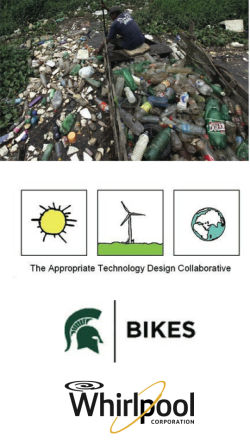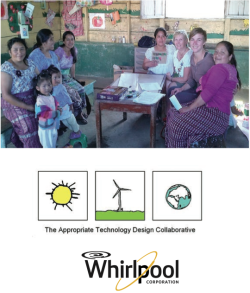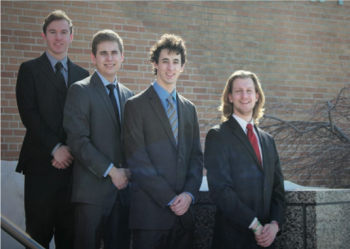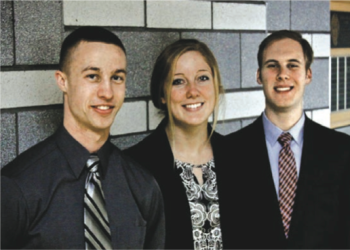Mechanical Engineering
International Projects
ME 491 International Humanitarian Engineering is a design-intensive interdisciplinary course in which teams of students address the challenges of creating new products that enhance the lives of the poor, while respecting their social, cultural and ethical identities.
The following project will be on display during Design Day from 8:00 until noon in the 1200 Hallway of the Engineering building:
Appropriate Technology Collaborative: Human Powered Plastic Recycler
 “Give a man a fish and you feed him for a day; teach a man to fish and you feed him for a lifetime.” This quote, by Confucius, is the philosophy of Appropriate Technology Collaborative (ATC). ATC is a non-governmental organization (NGO) in San Marcos La Laguna, Guatemala. Its mission is to empower low income communities through technology that improves the quality of life. This particular project builds upon a pre-existing trade, where local residents currently make a living by gathering and sorting raw plastic, then selling it to recycling plants to be processed at a low profit margin. ATC’s vision is to bring recycling processes into a local facility owned by the village, where plastic materials can be processed on-site. In addition, this project will empower Guatemalan women by providing them with dignified jobs. On- site processing of plastic materials will provide the opportunity to create plastic injection molded products and filament for 3D printing, a growing industry worldwide.
“Give a man a fish and you feed him for a day; teach a man to fish and you feed him for a lifetime.” This quote, by Confucius, is the philosophy of Appropriate Technology Collaborative (ATC). ATC is a non-governmental organization (NGO) in San Marcos La Laguna, Guatemala. Its mission is to empower low income communities through technology that improves the quality of life. This particular project builds upon a pre-existing trade, where local residents currently make a living by gathering and sorting raw plastic, then selling it to recycling plants to be processed at a low profit margin. ATC’s vision is to bring recycling processes into a local facility owned by the village, where plastic materials can be processed on-site. In addition, this project will empower Guatemalan women by providing them with dignified jobs. On- site processing of plastic materials will provide the opportunity to create plastic injection molded products and filament for 3D printing, a growing industry worldwide.
The first step in this process is shredding the plastic into flakes followed by cleaning the flakes using environmentally safe methods. If the cleaned and shredded plastic cannot be utilized in the local facility, it will be sold to off- site facilities for double the price of raw uncleaned plastic. Although industrial shredding systems and cleaning equipment are available in Guatemala, the high cost and energy demands are impractical for this application. The goal of our project is therefore to design and build a human-powered plastic shredder, and to develop an environmentally safe method for cleaning the plastic. Designs must be reproducible in Guatemala using only locally available resources.
Our team believes that the focused efforts of a small group of dedicated individuals can make significant changes to the world. By utilizing clean, efficient, human-powered recycling methods, based on mechanisms like bicycles, Guatemalan locals can dramatically enhance both their environmental and economic conditions. The production of a bicycle powered plastic recycler could not have been accomplished without the financial support of Whirlpool Corporation and guidance from MSU faculty and ATC staff.
Appropriate Technology Collaborative: Paynebar Nutrition Center-Solar Powered Fruit Dehydrator
 The diets of children in many parts of the world do not contain sufficient micronutrients. As a result of this malnutrition their growth is stunted, which hinders proper development. Panyebar Education and Nutrition Center in Guatemala is managed by Monika Goforth who assists in educating and feeding young children. The region produces foods with the required micronutrients, but only when certain fruits are in season and it is too costly for them to import them at other times.
The diets of children in many parts of the world do not contain sufficient micronutrients. As a result of this malnutrition their growth is stunted, which hinders proper development. Panyebar Education and Nutrition Center in Guatemala is managed by Monika Goforth who assists in educating and feeding young children. The region produces foods with the required micronutrients, but only when certain fruits are in season and it is too costly for them to import them at other times.
Guatemala suffers as one of the most micronutrient- deprived countries in the world and as the worst in Latin America. The food supply is often affected by natural disasters such as hurricanes, floods, erosion and deforestation. Panyebar, Guatemala is an isolated village populated primarily by landless peasants who work on nearby plantations farming coffee and sugar. Children here struggle with malnutrition and often become stunted in their growth because they do not consume the required vitamins. Children also become sluggish, have low energy and have difficulty learning or even playing. A solar fruit dehydrator would therefore be beneficial for storing more nutritious foods and creating a means of income.
The MSU team plans to build a solar fruit dehydrator to provide nutritious foods year-round and to provide a new means of income for the Education Center. The solar dehydrator will utilize free energy and incorporate thermal mass to increase the efficiency of the fruit dehydrating system. Upon completion of the project, a manufacture and assembly process will be written so that the solar dehydrator can be reproduced easily.

